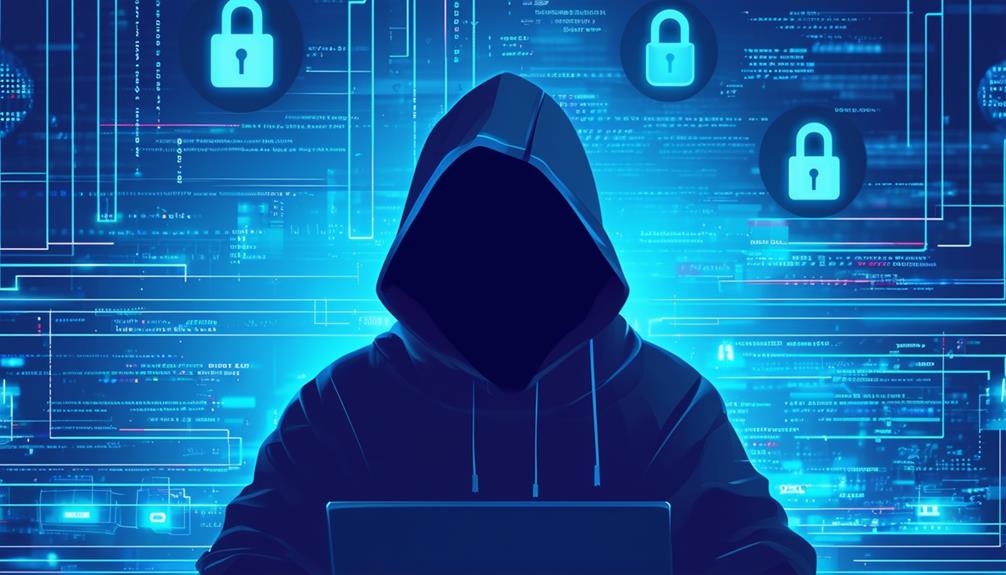Enhance website and server security with Ethical Hacking for Web Servers and Applications course. Uncover vulnerabilities, secure configurations, and prevent cyberattacks effectively. Learn web protocols, testing tools like Burp Suite and OWASP ZAP. Identify and address misconfigurations, outdated software, and weak coding practices to protect against breaches. Explore cloning websites, secure web applications, and prevent unauthorized data duplication. Master techniques, earn a digital badge, and align training with EC-Council CEH exam. Gain expertise in web security to fortify against cyber threats. Strengthen your defenses thoroughly. More insights await on securing your online assets.
Key Takeaways
- Learn to identify and prevent vulnerabilities in web servers and applications effectively.
- Implement robust security measures to secure server configurations and prevent breaches.
- Understand the risks posed by server misconfigurations and how to prevent them.
- Enhance cybersecurity defenses through regular updates, strong encryption, and strict access controls.
- Gain expertise in web security practices, testing tools, and methodologies to safeguard against cyber threats.
Course Overview
The course overview provides a thorough introduction to the objectives and structure of the Ethical Hacking: Hacking Web Servers and Web Applications Course. In this course, participants will explore the world of web servers and web applications, learning how to detect and prevent cyberattacks effectively.
Understanding web protocols and testing methodologies for vulnerabilities is a key focus, equipping students with the knowledge needed to secure these critical components of the online world. By gaining expertise in utilizing testing tools like Burp Suite and OWASP ZAP, individuals will be able to identify and address common web server vulnerabilities such as misconfigurations and outdated software.
This course aims to enhance skills in ethical hacking and web application security, preparing students to combat potential threats and safeguard digital assets. Through a detailed curriculum, learners will develop practical insights and hands-on experience in securing web servers and web applications against malicious intrusions.
Targeting Web Servers

Targeting web servers involves identifying vulnerabilities that can be exploited for various malicious purposes. Understanding how to prevent breaches by securing server configurations and implementing robust security measures is essential.
Web Server Vulnerabilities
Web server vulnerabilities often result from various factors such as misconfigurations, outdated software, and insecure coding practices. These weaknesses can leave web servers susceptible to hacking attempts and unauthorized access.
One significant vulnerability is the lack of encryption, which can expose sensitive data transmitted between the server and users to interception by malicious actors. This can lead to financial loss, data theft, espionage, activism, and sabotage.
In addition to encryption issues, misconfigurations in web servers can create entry points for attackers to exploit. Outdated software and insecure coding practices further compound these vulnerabilities, making it easier for hackers to compromise the server's security.
Exploiting Server Misconfigurations
Exploiting server misconfigurations, particularly in the context of web servers, poses a significant risk to cybersecurity posture and overall system integrity. Common misconfigurations such as insecure defaults, unnecessary services running, and weak access controls can make web servers vulnerable to cyberattacks. Attackers exploit these vulnerabilities to gain unauthorized access, manipulate data, or disrupt services.
To mitigate these risks, regular security audits and configuration reviews are vital. Implementing secure configurations, disabling unnecessary services, and applying access controls are effective measures to prevent server misconfigurations. By proactively addressing these issues, web server administrators can enhance the security of their systems and protect against potential breaches.
Understanding the impact of server misconfigurations and taking proactive steps to secure servers are essential in maintaining a robust cybersecurity posture for web servers. Stay vigilant, prioritize secure configurations, and enforce strict access controls to safeguard against unauthorized access and potential cyber threats.
Preventing Server Breaches
To enhance cybersecurity defenses and protect against unauthorized access, it is imperative to implement robust measures for preventing server breaches on web servers. When it comes to safeguarding your web servers, consider the following:
- Regularly update software and patches to address vulnerabilities promptly.
- Implement strong encryption protocols to secure data transmission.
- Enforce strict access controls to limit unauthorized entry.
- Conduct regular security audits and penetration testing to identify and address any weaknesses proactively.
Cloning Websites

Cloning websites involves replicating the HTML/CSS files, database content, and design elements to create a duplicate site. This process is often utilized in web hacking for various purposes.
By cloning a website, hackers can create a replica that appears identical to the original, posing significant security risks. The methodology for cloning a website typically includes copying all essential components, testing functionality, and ultimately launching the cloned site to mimic the original one.
Automated tools are frequently employed in this process to expedite the replication of content and design elements accurately. However, it is vital to note that cloning websites can be exploited for malicious activities such as phishing attacks or the distribution of malware.
Understanding the common methodology for cloning websites is essential for both ethical hackers and website owners to detect and prevent unauthorized duplication of web content, ensuring the security and integrity of their online presence.
Executing Attacks

Understanding the various motivations behind targeting web servers is essential for comprehending the complexities of executing attacks on these online assets. When delving into the domain of executing attacks on web servers, several vital points come into play:
- Financial Gain: Attackers may target web servers to steal financial information or conduct fraudulent activities.
- Data Theft: Sensitive data stored on web servers can be a prime target for cybercriminals seeking valuable information.
- Espionage: Hackers may aim to gather confidential data or monitor activities for espionage purposes.
- Sabotage: Some attackers might aim to disrupt services, damage reputation, or cause chaos by compromising web servers.
To carry out these attacks, perpetrators may employ techniques such as cloning websites, brute force attacks, and exploiting vulnerabilities within web servers. Understanding these methods is essential for fortifying defenses and securing web servers against malicious intrusions.
Web Server Vulnerabilities
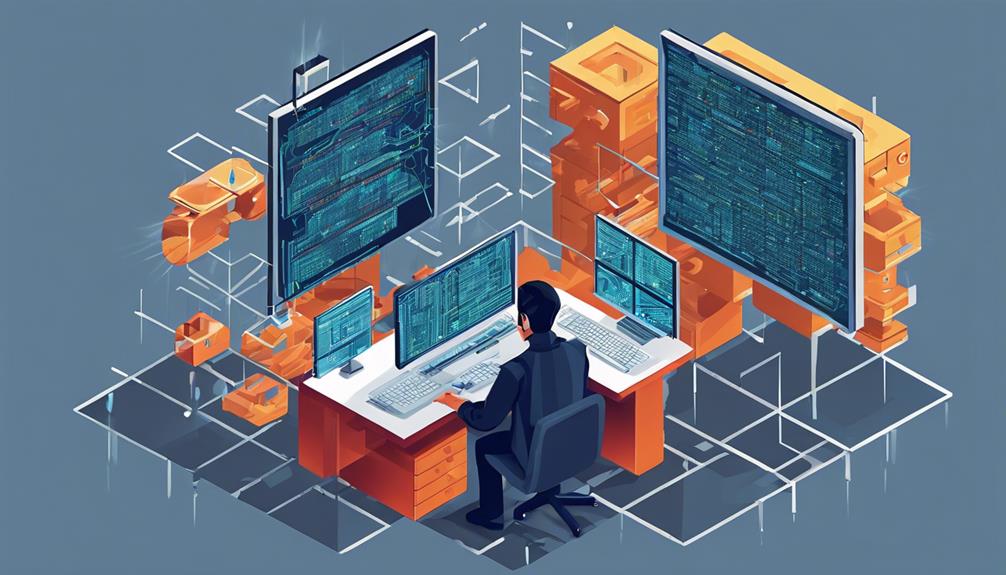
Web server vulnerabilities pose significant risks to the security and integrity of online assets, exposing them to potential exploitation by malicious actors. These vulnerabilities can stem from misconfigurations, outdated software, insecure coding practices, lack of encryption, and insufficient access controls.
Attackers target web servers for various nefarious purposes such as financial gain, data theft, espionage, activism, and sabotage. One common method employed by attackers is the use of brute force and dictionary attacks, where automated tools generate password lists to target login pages, execute login attempts, and exploit weak credentials.
Additionally, another concerning vulnerability is the practice of cloning websites. This involves copying HTML/CSS files, replicating database content, recreating design elements, testing functionality, and ultimately launching the cloned site.
Understanding these common methodologies for exploiting web server vulnerabilities is essential for individuals and organizations looking to secure their websites and web applications against cyber threats.
Securing Web Applications
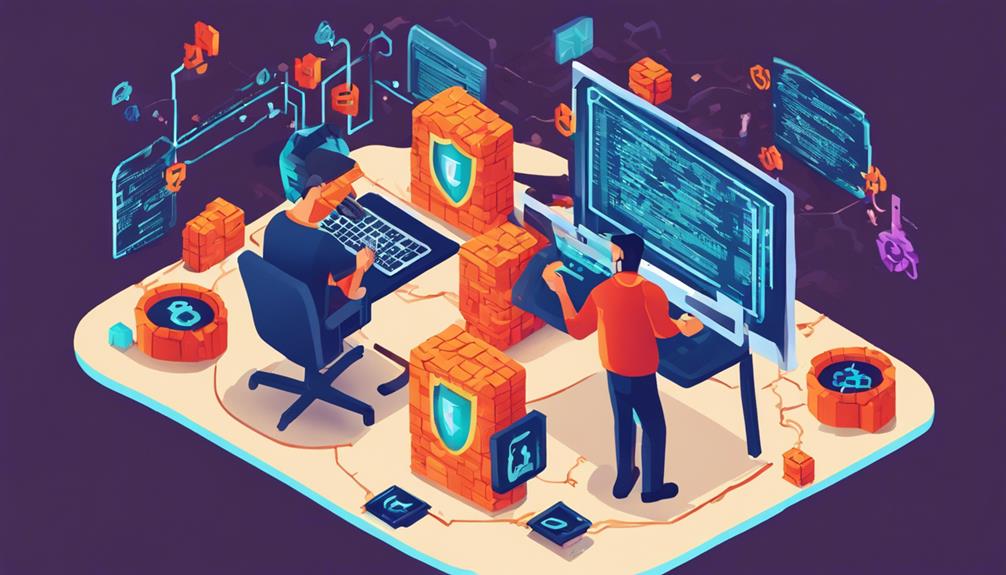
When it comes to securing web applications, implementing secure coding practices is essential to prevent common vulnerabilities like SQL injection and cross-site scripting attacks.
Additionally, utilizing web application firewalls can add an extra layer of protection by monitoring and filtering HTTP traffic to and from a web application.
Secure Coding Practices
Implementing secure coding practices is essential in safeguarding web applications against common vulnerabilities and ensuring robust protection for sensitive data.
When it comes to securing web applications, the following practices are vital:
- Input Validation: Implement strict input validation to prevent injection attacks such as SQL injection and cross-site scripting, which are common entry points for malicious activities.
- Secure Coding Techniques: Utilize methods like parameterized queries and user input escaping to fortify your web application against potential vulnerabilities.
- Session Management: Employ secure session management strategies like secure cookies and token-based authentication to maintain the integrity of user sessions.
- Encryption Methods: Use encryption protocols like HTTPS and TLS to secure data transmission, ensuring that sensitive information remains protected during communication between clients and servers.
Web Application Firewalls
Utilizing a robust security measure like Web Application Firewalls (WAFs) is essential in fortifying web applications against cyber threats. WAFs serve as protective barriers that monitor, filter, and block malicious traffic aimed at compromising web servers and applications. These security systems are adept at thwarting common cyber threats such as SQL injection and cross-site scripting, safeguarding sensitive data from potential breaches.
WAFs come in various forms, including hardware appliances, virtual appliances, and cloud-based services, offering flexibility in implementation to suit different web application environments. By analyzing incoming traffic and applying security rules, WAFs can detect and mitigate potential threats before they reach the web application, enhancing its overall security posture.
For individuals engaged in Ethical Hacking practices, understanding the importance of WAFs in securing web applications is paramount. Implementing a WAF is a proactive step in fortifying defenses against cyber threats, contributing significantly to the resilience and protection of web servers and applications.
Common Methodologies
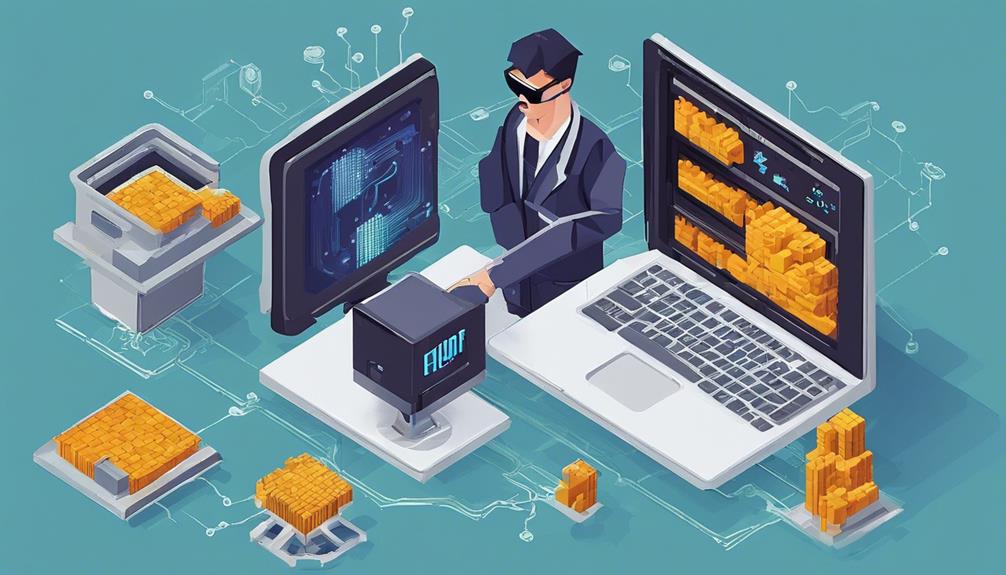
One of the key aspects in safeguarding web servers and web applications is understanding the common methodologies utilized by ethical hackers. These methodologies play an essential role in identifying vulnerabilities and enhancing the security of online platforms.
Here are some common methodologies:
- Brute Force and Dictionary Attacks: Automated tools are used to generate password lists and target login pages to exploit weak credentials.
- Web Server Misconfigurations: Vulnerabilities arise from misconfigured settings, outdated software, insecure coding practices, lack of encryption, and insufficient access controls.
- Cloning Websites: This involves copying HTML/CSS files, replicating database content, testing functionality, and launching the cloned site.
- Motivations for Attacks: Hackers may target web servers for financial gain, data theft, espionage, activism, or sabotage.
Earn a Digital Badge
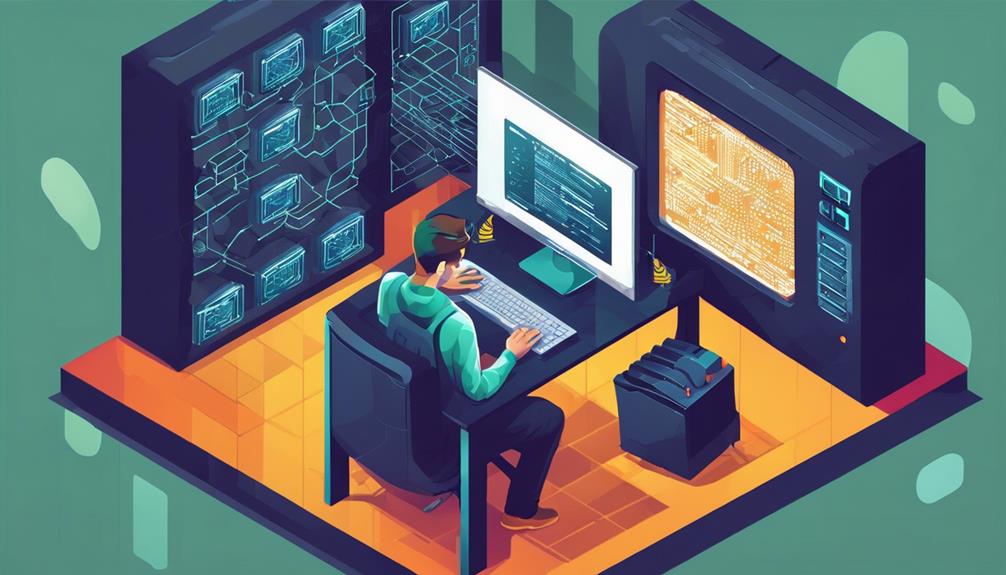
Acquiring a digital badge upon successful completion of the Ethical Hacking: Hacking Web Servers and Web Applications course highlights your expertise in securing online platforms. Skillsoft offers digital badges for this course, which can be shared on social networks and business platforms, showcasing your skills and achievements. These badges serve as permanent credentials that enhance your professional profile and provide recognition for your learning accomplishments.
By earning a digital badge through the course, you demonstrate your proficiency in securing web servers and web applications. These digital badges from Skillsoft are valuable credentials that validate your expertise in ethical hacking practices, distinguishing you as a skilled professional in the field. Displaying this badge signifies to employers and peers that you have successfully completed the course and have the knowledge and skills to secure online platforms effectively.
Earn your digital badge and showcase your expertise in web security today.
Expertise in Web Security

Enhancing proficiency in web security involves mastering techniques to detect and prevent web attacks effectively. Understanding web protocols and testing methodologies is essential to identifying vulnerabilities in servers and applications.
To excel in web security, consider the following key points:
- Learn how to detect and prevent web attacks through hands-on exercises.
- Understand common cyberattack prevention techniques and best practices.
- Explore testing tools like Burp Suite and OWASP ZAP to secure your web infrastructure.
- Align your learning with the EC-Council CEH exam (312-50) v11 for a thorough understanding of ethical hacking practices.
Frequently Asked Questions
What Is Web Application Ethical Hacking?
Web application ethical hacking involves identifying and exploiting vulnerabilities in web servers and web applications to strengthen security. Ethical hackers utilize tools like Burp Suite and OWASP ZAP, understanding web protocols, and common attack methods like SQL injection and cross-site scripting.
What Website Teaches Ethical Hacking?
Discover the secrets of ethical hacking with LinkedIn Learning's all-encompassing course on web servers and applications security. Guided by expert Malcolm Shore, this platform offers practical training and certification for aspiring cybersecurity professionals.
What Is Web Hacking in Cyber Security?
Web hacking in cybersecurity refers to exploiting vulnerabilities in web servers and applications for unauthorized access or service disruption. Attackers target these systems for various reasons, necessitating an understanding of hacking methods to enhance protection measures.
Conclusion
To wrap up, the ethical hacking course on hacking web servers and web applications provides vital knowledge and skills to secure websites from potential cyber threats.
By learning about vulnerabilities, attack methodologies, and best practices for securing web applications, students can enhance their expertise in web security.
This course offers a thorough understanding of web security, empowering individuals to protect their sites effectively.
Earn a digital badge and gain confidence in safeguarding web servers and applications from malicious attacks.

